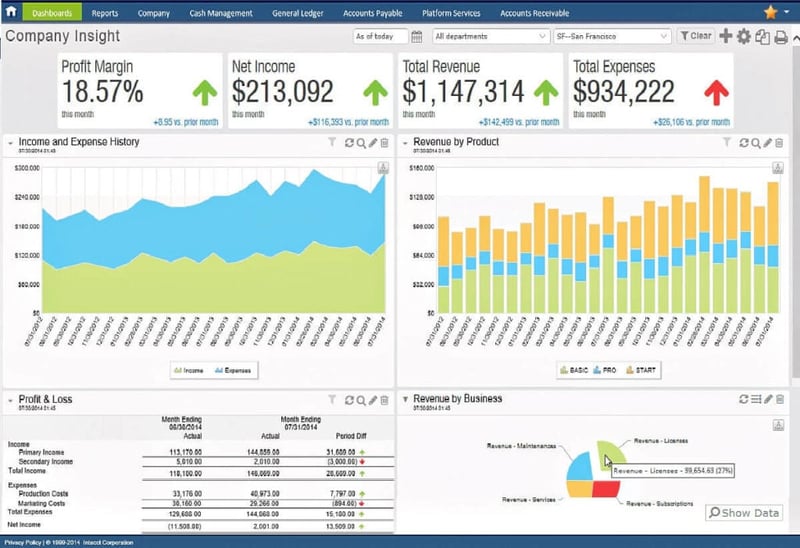No one wakes up in the morning looking forward to migrating from Sage 100. It's not something you do for fun! While it can be a challenge to fit it in along with all your other priorities, upgrading your financial management software can transform your accounting department while delivering significant return on your investment.
Here are five of the most common reasons companies decide to migrate from Sage 100 to Sage Intacct.
1. You need real-time insights and Excel spreadsheets just aren't cutting it.
Sage 100 offers a number of reporting solutions, but as companies grow we find clients are often frustrated with the lack of flexibility and how difficult these reporting tools are to use. Often, finance is completely dependent upon IT or an external consultant to modify existing reports or create new ones. As a result, they spend far too much time manually entering data into Excel, endlessley manipulating data, and formatting required reports, charts, and graphs by hand.
Sage Intacct has built-in dashboards and reports that can massively reduce or even eliminate the need for Excel-based accounting. Sage Intacct's dashboards and reports give instant visibility and enable timely, data-driven decisions because it's updated in real-time and configurable for each users' unique needs.

2. Manual processes are compromizing organizational effectiveness and profitability.
Sage 100 offers a solid suite of financial and operations modules, but wasn't optimized for certain types of industries (e.g. software/SaaS, professional services, media and entertainment, and not-for-profits). Organizations must adopt manual workarounds for contract management, revenue recognition, project accounting, fund management, etc. And the team overall will be far less effective as employee productivity slows, customer service limps, and profitability shrinks.
Sage Intacct automates key processes such as opportunity to cash, project accounting, and fund management that can facilitate cost-effective growth.
3. Multi-entity / location organizations require more flexibility from their financial management software.
Sage 100 was a cutting-edge solution when it was released...in the 1990s. While still capable in many ways, Sage 100 can hamper modern organizations who need a cutting-edge solution to keep up.
In contrast, Sage Intacct was built from the ground up for the cloud and offers robust flexibility for today’s organization, including:
- Multi-entity management – automatically consolidate financial and operational reports, inter-company transactions, allocations, shared chart of accounts (COA), customers, and vendors
- Dimensional accounting – rather than relying upon the chart of accounts and user-defined fields, Sage Intacct offers the ability to track and analyze an unlimited number of data dimensions
- Multi-book accounting – track and report on an unlimited number of books (e.g. accrual, cash, tax, GAAP, etc.)
4. “Best-in-class” is the best approach moving forward.
When Sage 100 was released in the 90s, (hence, the original name MAS 90), the prevailing wisdom was that a suite of modules from a single solution provider was the best way to enable required functionality across the organization. The idea was that this methodology would simplify integrations, ongoing support, and periodic upgrades. The problem is, no single suite of applications delivers on that promise. Further, only part of the suite represented the ideal solution, forcing the remainder of the organization to compromise with sub-optimal solutions.
Most organizations these days would like to migrate away from the limitations of a single vendor suite and have invested in “best-in-class” solutions – Salesforce, Adaptive Insights, AvidXchange, ADP, to name a few. Sage Intacct is a perfect fit for a “best-in-class” organization. It integrates with more than 200 leading cloud solutions, with APIs that are 12+ years backwards compatible, ensuring that integrations stay working after upgrades. As a result, clients can utilize the tools they want for each line of business and have confidence that the entire solution will work together seamlessly.
5. Embrace the cloud to elevate your strategic focus and success!
More and more organizations are looking for better ways to reduce the burden on internal IT and free up in-house resources to pursue more value-added activities like serving clients and driving the company’s mission forward. Sage 100 is an on-premises application. It can be hosted, but this doesn’t drive transformation in the same ways a true cloud application does.
Sage Intacct provides access from anywhere, anytime, on any device you prefer. The annual subscription includes 4, hassle-free updates each year and includes all hosting, backups, and data security. Your accounting, finance, and IT teams will be able to make the best use of their time and be a more strategic resource for your entire organization with the time they save.
Should you migrate?
Visit our Sage Intacct Migration Center to find answers to frequently asked questions, download a Sage 100 vs Sage Intacct product comparison, watch the Sage Intacct product tour and more!


